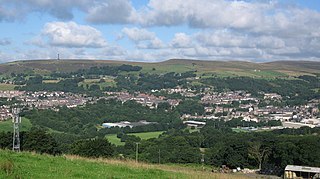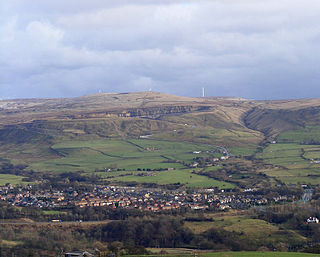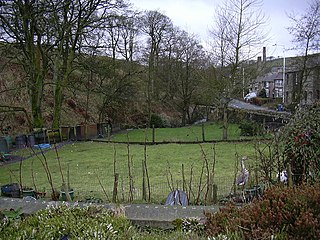
Bacup is a town in Lancashire, England, in the South Pennines close to Lancashire's boundary with West Yorkshire. The town is in the Rossendale Valley and the upper Irwell Valley, 3.5 miles (5.6 km) east of Rawtenstall, 6.4 miles (10.3 km) north of Rochdale, and 7 miles (11 km) south of Burnley. At the 2011 Census, Bacup had a population of 13,323.

Rossendale is a district with borough status in Lancashire, England, holding a number of small former mill towns centred on the valley of the River Irwell in the industrial North West. Rossendale combines modest size urban development with rural villages and is immediately south of Burnley, east of Blackburn and north of Bolton, Bury, Manchester and Rochdale, centred 15 miles (24 km) north of Manchester.

West gallery music, also known as Georgian psalmody, refers to the sacred music sung and played in English parish churches, as well as nonconformist chapels, from 1700 to around 1850. In the late 1980s, west gallery music experienced a revival and is now sung by several west gallery "quires" (choirs).

Haslingden is a town in Rossendale, Lancashire, England. It is 16 miles (26 km) north of Manchester. The name means 'valley of the hazels' or 'valley growing with hazels'. At the time of the 2011 census the town had a population of 15,969. The town is surrounded by high moorland; 370 m (1215 ft) to the north; 396 m (1300 ft) Cribden to the east; 418 m (1372 ft) Bull Hill to the south.

Heywood is a town in the Metropolitan Borough of Rochdale, Greater Manchester, England. Historically part of Lancashire, it had a population of 28,205 at the 2011 Census. The town lies on the south bank of the River Roch, 2.4 miles (3.9 km) east of Bury, 3.7 miles (6.0 km) west-southwest of Rochdale, and 7.4 miles (11.9 km) north of Manchester. Middleton lies to the south, whilst to the north is the Cheesden Valley, open moorland, and the Pennines. Heywood's nickname, Monkey Town, is known to date back to 1857.

The Lancashire Cotton Famine, also known as the Cotton Famine or the Cotton Panic (1861–65), was a depression in the textile industry of North West England, brought about by overproduction in a time of contracting world markets. It coincided with the interruption of baled cotton imports caused by the American Civil War and speculators buying up new stock for storage in the shipping warehouses at the entrepôt.

Edwin Waugh (1817–1890) was an English poet.

Ramsbottom is a market town in the Metropolitan Borough of Bury, Greater Manchester, England. The population at the 2011 census was 17,872. Historically in Lancashire, it is on the River Irwell in the West Pennine Moors, 3.9 miles (6.3 km) northwest of Bury, and 12 miles (19 km) of Manchester.

Tottington is a town in the Metropolitan Borough of Bury in Greater Manchester, England, on the edge of the West Pennine Moors.

Edenfield is a village within the Rossendale borough of Lancashire, England. Lying on the River Irwell, it is around 1.25 miles (2.0 km) north of Ramsbottom, 2.5 miles (4.0 km) south of Rawtenstall, and 6.0 miles (9.7 km) west of Norden, and has a total population of 2,080, reducing to 2,053 at the 2011 Census.

Rawtenstall is a town at the centre of the Rossendale Valley in Lancashire, England, with a population of 22,000. It is the seat for the borough of Rossendale. The town lies 15 miles north of Manchester, 22 miles east of Preston and 45 miles south east of the county town of Lancaster.

Crawshawbooth is a small village on the edge of the Pennine hills in England just north of the market town of Rawtenstall, Lancashire, and just south of Loveclough. It is part of the valley of Rossendale, an ancient royal hunting ground. The majority of surrounding land is farm and moor land and many walkers come to the area.

Waterfoot is a historic mill town in the Borough of Rossendale between Rawtenstall and Bacup in Lancashire, England, where the B6238 road from Burnley meets the A681 road. It is where the Whitewell Brook meets the River Irwell.

Helmshore is a village in the Rossendale Valley, Lancashire, England, south of Haslingden between the A56 and the B6235, 16 miles (26 km) north of Manchester. The population at the 2011 census was 5,805. The housing in Helmshore is mixed, with some two-up, two-down terraces, top-and-bottom houses and a few surviving back-to-back cottages. Between the 1970s and 2020 new housing estates have proliferated.

The Lancashire dialect or accent is Northern England's vernacular speech in the English county of Lancashire. The region is notable for its tradition of poetry written in the dialect.

The South Pennines is a region of moorland and hill country in northern England lying towards the southern end of the Pennines. In the west it includes the Rossendale Valley and the West Pennine Moors. It is bounded by the Greater Manchester conurbation in the west and the Bowland Fells and Yorkshire Dales to the north. To the east it is fringed by the towns of West Yorkshire whilst to the south it is bounded by the Peak District. The rural South Pennine Moors constitutes both a Site of Special Scientific Interest and Special Area of Conservation.

The Musbury Valley is a small valley in the Helmshore area of Rossendale Valley, Lancashire. Musbury Brook flows through its length, and its south side is flanked and dominated by Musbury Tor. In the 14th century it was part of the Earl of Lincoln's hunting park. Most of the Musbury valley is now sheep grazing pasture. To the south is Musbury Tor and Alden Valley; to the north-west is Musbury Heights and, beyond, the Grane Valley. Beginning as Long Grain Water on Musden Head Moor, the stream becomes Musbury Brook after its confluence with Short Grain Water. It flows in a north-westerly direction to join the River Ogden, a tributary of the River Irwell.
104.7 Rossendale Radio is a community radio station in the north west of England, broadcasting on 104.7 FM to Haslingden, Rawtenstall, Ramsbottom and surrounding areas and online at www.rossendaleradio.com.

Broadclough – historically Broad Clough – is a village located to the north of Bacup, previously having been a part of the old borough of Bacup and now with Rossendale borough of Lancashire and part of the Greenclough Ward. It is part of the Rossendale and Darwen constituency, with Jake Berry having been the Member of Parliament since 2010. Like much of Bacup, Broadclough is rapidly becoming a commuter area for cities and towns such as Manchester, Burnley, Accrington, Preston, Blackburn, Rochdale.

















